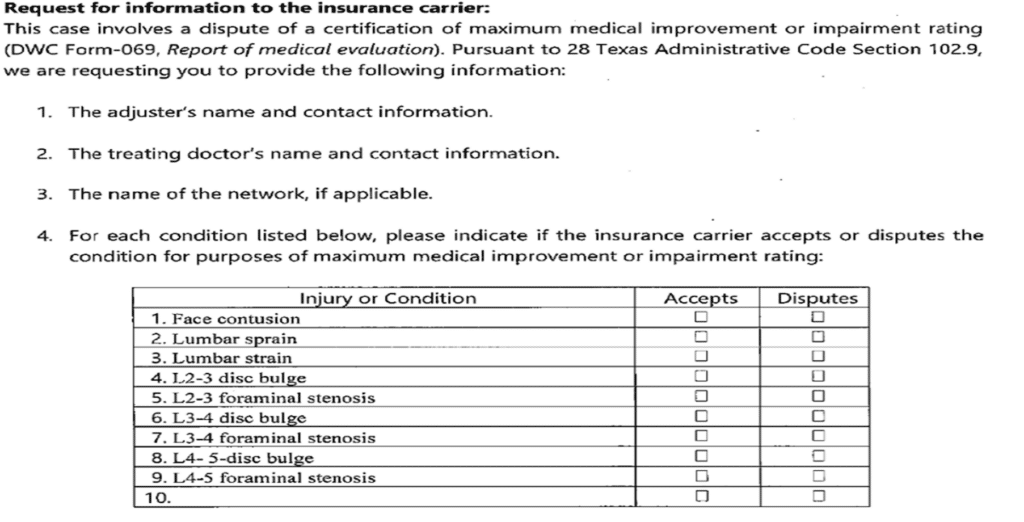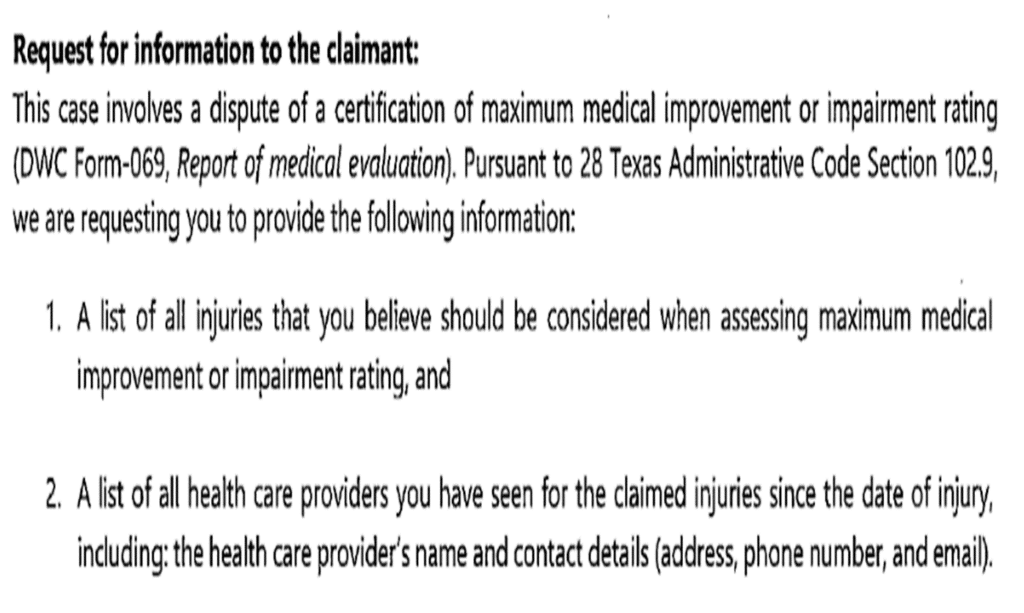Our Attorneys at Downs & Stanford, P.C. are here to help you with your every day questions with Texas Workers’ Compensation. Please see the newest updates below in what is happening with the DWC.
Lunch and Learns – First Come, First Served CEU Credits for All Adjusters
Want Some Credit? Come and Get It!
See the class being offered below; the first 25 adjusters to sign up will be in the course. Once you have registered, you will receive confirmation for the Webinar. The Zoom link will be emailed the Monday before each Webinar.
Please note if you have taken the course listed below in the last two years, you will not be eligible for credit again per Texas Administrative Code §19.1010 (7)(c).
Don’t delay! Email us today at CE@downsstanford.com.
October 13, 2023 from 12:00 P.M. to 1:00 P.M.: Recorded Statements Webinar with Chris Losey and Charles Morse
October 27, 2023 from 12:00 P.M. to 1:00 P.M.: Compensability, Defenses, and Deadlines Webinar with Wendy Schrock and Rynn Freiling
DWC HAPPENINGS
YOUR MONTHLY LOOK AT WHAT IS HAPPENING AT THE DIVISION AND HOW IT IMPACTS CARRIERS
It’s been a slow month in the world of the Division of Workers’ Compensation, but things should be picking up in future months. Carriers are waiting for the updated DWC maximum/minimum benefit rates to release, which should come in the next 10 to 15 days. You can find the current State Maximums and Minimums here.
Additionally, the DWC is currently requesting comments on proposed changes to the DWC-52, Application for Supplemental Income Benefits. A review of the proposed DWC-52 shows that adjusters will no longer be asked to note the county of a Claimant’s residence for purposes of determining the minimum weekly job searches, but they will be required to list the number of job searches on the new work search log. The log now asks for the date that a Claimant applied for a job, the position, the employer contact information, and whether a job was offered. It has also removed the worksheet to determine how the Claimant’s wages impact entitlement. There is also a proposed form that would address TIBS and AWWs for temporary/seasonal employees. These proposed new forms can be found on the DWC website, at www.tdi.texas.gov.
Finally, each month brings us more disciplinary orders in the system, largely of Carriers and doctors. This month’s highlighted disciplinary order highlights a Designated Doctor, Dr. Anthony Owusu, who managed to run so far afoul of the DWC that he is no longer allowed to practice in the system. Apparently, Dr. Owusu failed to properly apply the AMA Guides, failed to ask for additional time in which to complete his reports, and failed to complete DWC-68s and DWC-69s. Additionally, this was his second consent order in 15 months, the first one being for making unnecessary referrals and outside testing, failing to properly file medical records, failing to apply DWC treatment guidelines, and submission of inaccurate or deficient reports due to inappropriate or unreasonable evaluations. Dr. Owusu agreed to walk away from performing DD examinations, agreed not to act as a peer review or RME doctor, and will pay an $8,500 fine to the DWC. Suffice it to say, we do not believe we will be seeing Dr. Owusu any longer in the Texas workers’ compensation system.
Division of Workers’ Compensation OARFI-IC Form
Request for Information on Extent of Injury and DWC-24s
As you know from our prior advisory, the Division unveiled new forms designated OARFI-IE for injured employees and OARFI-IC for insurance carriers. (See examples below.) The forms seek information from the parties regarding disputes concerning maximum medical improvement and impairment ratings. The OARFI-IC requests the adjuster’s information, treating doctor’s name, network name (if applicable), and whether certain conditions specifically listed on the form are or are not accepted as compensable by the insurance carrier.
The Division has created a new staff position called “Benefit Review Officer-1.” The BRO-1s are calling adjusters and requesting them to complete DWC-24s regarding the accepted or accepted/disputed conditions. The DWC is trying to obtain an agreement on diagnoses indicated as accepted when the language on the OARFI-IC plainly states information supplied is non-binding and for purposes of mediation only. The question is: Why is the DWC being so pushy to get agreements on diagnoses that are not in dispute? Is this to trump up their number for agreements?
Downs & Stanford recommends that you contact your legal counsel or direct DWC to your legal counsel for assistance before signing any Benefit Dispute Agreement (DWC-24).
What this means to you:
- Contact your legal counsel before completing the OARFI-IC, or at the very least, review your PLN-11 before completing it.
- Contact your legal counsel if the Division calls or emails you regarding signing a DWC-24.
OARFI-IC FORM

OARFI-IE FORM

Decisions, Decisions, and More Decisions
Current Cases that You Need to Know
• APD 230841
DECISION: The disability issue as determined by the ALJ was different than the disability issue as agreed to by the parties at the CCH. Hence, the ALJ did not make a determination for all periods in dispute. The AP noted the worker testified he normally worked 40 hours a week prior to the injury and returned back to work working substantially less hours.
WHAT THIS MEANS FOR YOU: Changing the issues at the CCH can lead to errors in the D&O.
• APD 230873
DECISION: The ALJ did not find good cause to add an extent of the injury issue for multiple conditions despite MMI and IR being the issues at the CCH. Regarding MMI, the DD selected an MMI date based on ROM measurements taken before the IW underwent surgery believing the surgery did not result in any improvement. The AP noted again that it is of “no moment” the worker actually improved or not; rather, the inquiry is “whether based upon reasonable medical probability, material recovery or lasting improvement could reasonably be anticipated.”
WHAT THIS MEANS FOR YOU: Apparently, extent is no longer a threshold issue for MMI/IR.
• APD 230950
DECISION: The decision failed to address all the extent of the issues certified during the BRC. Thus, the case is remanded to the ALJ to resolve all the disputed issues.
WHAT THIS MEANS FOR YOU: That extent list is important.
• APD 230893
DECISION: The D&O failed to address any of the extent of the injury issues. The AP reversed for the ALJ to include those conditions.
WHAT THIS MEANS FOR YOU: The D&O did not pass QC.
• APD 230904
DECISION: The DD did not use his own ROM measurements and did not explain where he obtained the ROM measurements used to calculate the IR. Since the AP did not know where the ROM measurements came from, the AP could not recalculate the IR.
WHAT THIS MEANS FOR YOU: DDs must show their math.
• Am. Zurich Ins. Co. v. Miller, __ S.W.3d __, 2023 Tex. App. LEXIS 6649 (Tex. App.—Houston [1st Dist.] Aug. 29, 2023, no pet. h.)
DECISION: The worker was a truck driver. He arrived at a delivery location that was not ready to receive the delivery. He decided to walk to a bank for cash and a convenience store for breakfast. The worker said the employer expected the employees to “eat and drink” on the job and more importantly for the court, the employer did not have a written policy prohibiting employees from doing so. Instead of crossing six lanes of traffic, the employee walked across an elevated railroad track which was private property. Unfortunately, a train blew by him, and he lost his footing, falling twenty-five feet onto the highway sustaining serious injuries. The court first held that securing food in the manner provided was as a matter of law an activity that satisfies the Personal Comfort and Convenience Doctrine. In a footnote, the court did say they “do not hold the personal comfort and convenience doctrine is applicable in every case the employee leaves the workplace to get food or drink, even with the employer’s permission.” The carrier believed the activities were a deviation. The court described the activities “as leaving his truck momentarily to get cash to buy food while he waited for his truck to be unloaded” and therefore not a deviation. And the commission of a misdemeanor (trespass) is not grounds to deny workers compensation benefits.
WHAT THIS MEANS FOR YOU: The scope of the Personal Comfort and Convenience Doctrine is broader than originally thought.
• Woodard v. Tex. Dep’t of Ins., Div. of Workers Comp., __ S.W.3d __, 2023 Tex. App. LEXIS 6662 (Tex. App.—Houston [1st Dist.] Aug. 29, 2023, no pet. h.)
DECISION: A pro se worker lost her claim before DWC. The worker was a gig employee who used an app called Handy that connects cleaning professionals to businesses that seek cleaning services. DWC held she was not an employee of the business that retained her services through the app. She subsequently filed a negligence action, not a claim for judicial review, against her alleged employer and the carrier. An MSJ was granted. The worker then filed a lawsuit against DWC complaining of its decision. She then filed a “Motion for Re-Hearing” complaining of the alleged employer and carrier but did not name them in the suit or serve them with process. At this point, the carrier answered the lawsuit although not named or served and filed an MSJ. The court held the carrier conclusively established its affirmative defense of limitations since the worker sought judicial review three months after her deadline.
WHAT THIS MEANS FOR YOU: Plaintiffs, even pro se, must sue the right parties in a timely fashion.
• Rush Truck Ctrs. of Tex., L.P. v. Mendoza, __ S.W.3d __, 2023 Tex. App. LEXIS 7022 (Tex. App.—El Paso Sep. 1, 2023, no pet. h.)
DECISION: The employer required its employees to sign an arbitration agreement. Afterwards, the worker died, and the carrier paid death benefits. The spouse sued the employer for gross negligence. The court held that gross negligence claims are not derived from the TWCA but from the Texas Constitution provision allowing employees to sue their employers for all homicides by way of an intentional or grossly negligent act. The arbitration agreement would therefore apply to claims of gross negligence since that is a claim made in negligence outside of the workers’ compensation claim.
WHAT THIS MEANS FOR YOU: If upheld, sophisticated employers will change their policies inserting such arbitration agreements to include gross negligence claims.
• Harris County v. Dogan, __ S.W.3d __, 2023 Tex. App. LEXIS 3063 (Tex. App.—Houston [1st Dist.] May 9, 2023, no pet. h.)
DECISION: The court upheld the worker sustained a compensable heart attack. But the court also allowed a finding of disability despite neither party submitting that issue to the jury.
WHAT THIS MEANS FOR YOU: Houston Courts of Appeal are generally favorable to the worker.
You’ve got WC questions? We have answers. Send your questions to Q&A.
For Employer’s Liability, General Liability, Subro, and all other areas of law, email questions here.
Want some CE credit? Come and get it! Join us for Lunch and Learns every Friday. For information and registration, email CE Department.
Have questions about Designated Doctors, RMEs, or Peer Reviews or have records for a DD, RME, or Peer? Email our DD Department.
Do you have a hearing and need help or need to send records for an already set hearing? Please send all set notices and records to DWCHearings@Downsstanford.com.

